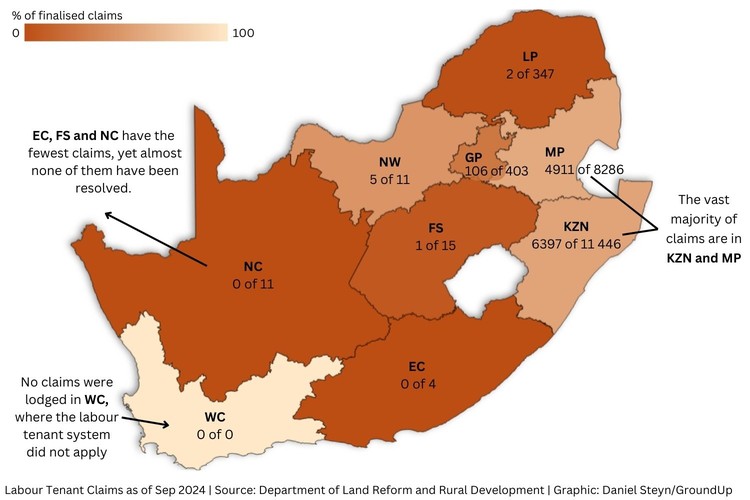
2 October 2024
In September officials at the Department of Land Reform and Rural Development revealed that only 11,422 claims submitted by labour tenants have been resolved. Graphic: Daniel Steyn
More than two decades after tens of thousands of labour tenants lodged land claims, only a little more than half of these claims have been finalised.
Labour tenants are farm workers who, under apartheid, were given access to land instead of monetary payment. The system came to be regarded as unjust, and the 1996 Labour Tenants Act guaranteed title deeds for people who were labour tenants.
The deadline to submit claims ended in 2001. Since then, the Department of Land Reform and Rural Development has been responsible for processing claims and to ensure that legitimate claims are resolved by giving title deeds to the rightful beneficiaries.
The latest figures presented in Parliament by department officials in September, show that only 11,422 of 20,523 claims (55%) of all the claims in the department’s database, have so far been finalised. This is a small advance on 2022, at which stage 10,992 claims had been finalised. The department’s target for 2024/25 is to resolve a further 268 claims. At that rate, it will take longer than 30 years before all cases are resolved.
A lack of capacity within the department and claims getting lost have been blamed for underperformance since 2002.
In 2015, the department admitted in a court case brought by labour tenants that it did not have a full database of outstanding cases. The department has since implemented a “lost claims” strategy, but progress is slow. People working in the sector believe the number of unresolved claims is much higher than those in the department’s database. Since 2022, 63 cases were added to the database, according to figures presented by the department in Parliament.
Sometimes farm owners are reluctant to cooperate with the department. There have been cases where labour tenants are evicted, despite the Labour Tenants Act prohibiting evictions of people with pending land claims.
In 2019, the Constitutional Court ordered the appointment of a Special Master of Labour Tenants to work with the department to help speed-up the claims process. Prof Richard Levin was appointed to the post.
Levin told GroundUp that if the system worked properly, the department could be finalising 1,000 cases a year. But since his appointment, there have been more delays.
The department initially challenged the court’s decision to appoint a Special Master, but failed. The department was meant to appoint additional staff to work with Levin on resolving cases, but some regional branches still do not have staff dedicated to labour tenants, Levin said.
Another challenge has been changing the way in which the department approaches labour tenant claims. Since 2002, the department has dealt with labour tenants in the same way it deals with farm dwellers.
According to Levin, this has resulted in, for example, land being acquired from farmers, often at a high market-related price, and Communal Property Associations (CPAs) being created where labour tenants and farm dwellers are members together.
The department has admitted in court that it had been using land restitution and land reform programmes, which are governed by different legislation, to resolve labour tenant cases. This approach was criticised in the 2019 Constitutional Court judgment.
Levin said he has faced resistance when implementing new procedures that will bring the process of resolving cases closer to what is envisaged by the legislation.
It also takes time to get these claims to a point where title deeds can be handed over to labour claimants for the exact piece of land they’ve lived on for generations. Until clearer precedents have been established in the Land Court, which has also been overburdened and understaffed, there are bound to be delays, Levin said.
Non-profit organisation, the Association for Rural Advancement (AFRA), which together with labour tenants, brought the litigation that led to the appointment of the Special Master, attends quarterly hearings in the Land Court, with the department and Special Master.
AFRA’s strategy manager Siya Sithole told GroundUp that during a hearing in February, the court directed the department to meet with everyone involved to deal with blockages in the process. To date that meeting has not happened, he said. During the hearing, Levin’s term was extended for another five years.
“The department has not shown any signs of embracing the Constitutional Court order that compelled the department to prioritise the processing of the outstanding claims,” says Sithole.
He believes the department has dragged its feet on appointing staff dedicated to the Labour Tenants Claims Resolution Programme. “They have repeatedly not complied with directives of the Land Court, and they have not displayed any appetite to support the Special Master.”
The Department did not respond to our questions.